1) We all know that sales of smartphones and tablets are are growing fast, however…
2) Those sales are growing even faster than we may realize, and…
3) The implications of this new wave of computing devices is going to be enormous; is going to impact us sooner than we anticipate, and…
4) We have to make ready or it will pass us by or, more likely, sweep our current way of conducting our businesses away.
Part 1: The Exhibits In Evidence
The iPhone & iPad Lit A Fuse Under The Rocket That Is Post-PC
— Most of the growth in mobile computing has come in just the last three years. ((This year we will sell around 300 million PCs and laptops while we will also sell just over 300 million tablets. By the end of 2015, we will be selling less than 300 million PCs and laptops and will be selling well over 350 million tablets. In fact, some market researchers think that by 2017 we could be selling 500 million tablets a year around the world. This makes tablets a serious growth market. While I state that the tablet journey has gone on for well over 20 years, its accelerated growth has come in just the last three years. ~ Tim Bajarin (@Bajarin)))
After only being in existence for 5 years, the iPhone is the second best selling product of all time – the 1st is the Rubik’s Cube. ~ UberFacts (@UberFacts)
I believe that the iPhone and iPad is to mobile computing what the Model-T was to cars.
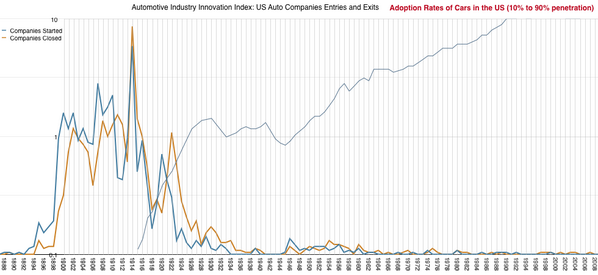
The above chart, from Horace Dediu of Asymco, shows the growth of the car industry before and after the introduction of the Model-T. There were literally hundreds of car makers who, in the twenty years prior to the introduction of the Model-T, were all trying create THE car that would make the fledgling auto industry viable and profitable. As it turned out, it wasn’t so much the car itself, but a new method of cheaply mass manufacturing cars in quantity, that proved to be the key to unlocking the value that lay the car industry.
Similarly, while the iPhone was a brilliant achievement in itself, it wasn’t until the next year, when Apple introduced what was later to be known as iOS, along with the App Store, that the modern Smartphone was truly born. The combination of the iPhone, iOS and the App Store were the modern day equivalent to the procedure for mass producing the Model-T. The Model-T cracked the problem of production. The App Store cracked the problem of mobile software distribution. Both changed their respective worlds, forever. ((Don’t allow yourself to be distracted by parochialism. Nowadays, Apple isn’t happening to mobile. The future is happening to mobile.))
BLACK FRIDAY
— As you read the follow data concerning mobile, keep in mind that Black Friday sales were DOWN this year.
— However, online shopping was UP.
— And sales of electronics were up; sales of mobile devices were up, Up, UP; and sales of tablets, in particular, were out-of-sight.
MOBILE PHONES
— Apple has 500,000 iPhone 5Ss being made every day, its highest ever output.
1.7bn mobile phones (feature phones and smartphones) were sold in 2012 alone – 3.2bn people use a mobile phone worldwide – Smartphones gain quickly as phones are replaced every 18 to 24 months. ~ Jean-Louis Gassée
TABLET SALES

— eBay reported selling one iPad per SECOND as of midnight on Black Friday.
— iPad Mini the top seller at Walmart.
— Apple products were 22% of Target’s sales on Black Friday.
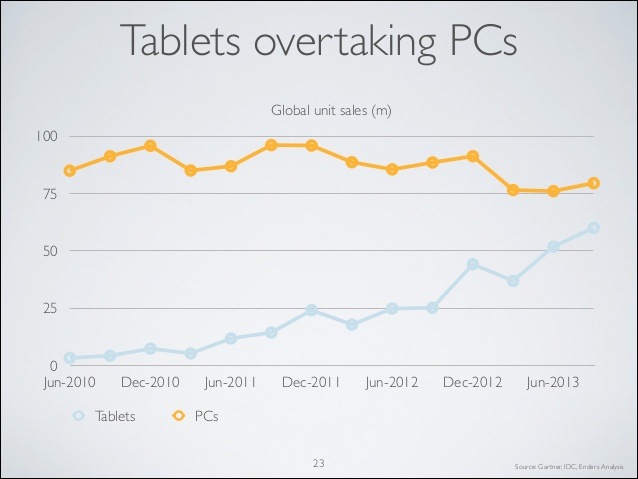
Source: Mobile Is Eating The World, Benedict Evans
TABLET PROJECTIONS
— Estimating tablet sales increase of 38% from Q4 2012. ~ Ben Bajarin (@BenBajarin)
— Worldwide sales of tablets and PCs are going to be very close this Q4. ~ Ben Bajarin (@BenBajarin)
To chart how quickly the market is shifting to tablets, consider that in February 2013, Canalys noted that tablets accounted for only one-third of all personal computers shipped. For all of 2013, Canalys had predicting originally predicted that tablets will account for 37% of all PCs shipped, with some 182.5 million tablets out of a total 493.1 million units, although today it is revising that up to 40%. ~ Techcrunch

(Author’s Note: Ben Bajarin did all the research and hard work necessary to create the above chart, yet was kind enough to allow me “steal” the fruits of his labor. Thank you, Ben.)
Tablet sales will probably overtake TV sales in the next few quarters. Getting internet video onto the TV itself might not matter. ~ Benedict Evans (@BenedictEvans)
Stop! You might want to re-read the above. Tablet sales might overtake TELEVISION sales in the next few quarters!
Amazing.
PERSONAL COMPUTERS (PCs)
From talking with many friends and family over the holidays there was one tech product I heard no one say they were buying – a PC. ~ Ben Bajarin (@BenBajarin)

(Author’s Pet Peeve: Tablets are not “cannabalizing” PC’s. Sharks don’t “cannabalize” fish, they devour them. Tablets are not “cannabalizing” PC’s, they’re eating them up.)
Interesting to hear more and more consumers tell us they are self aware of the fact that the PC is overkill for their main use cases. ~ Ben Bajarin (@BenBajarin)
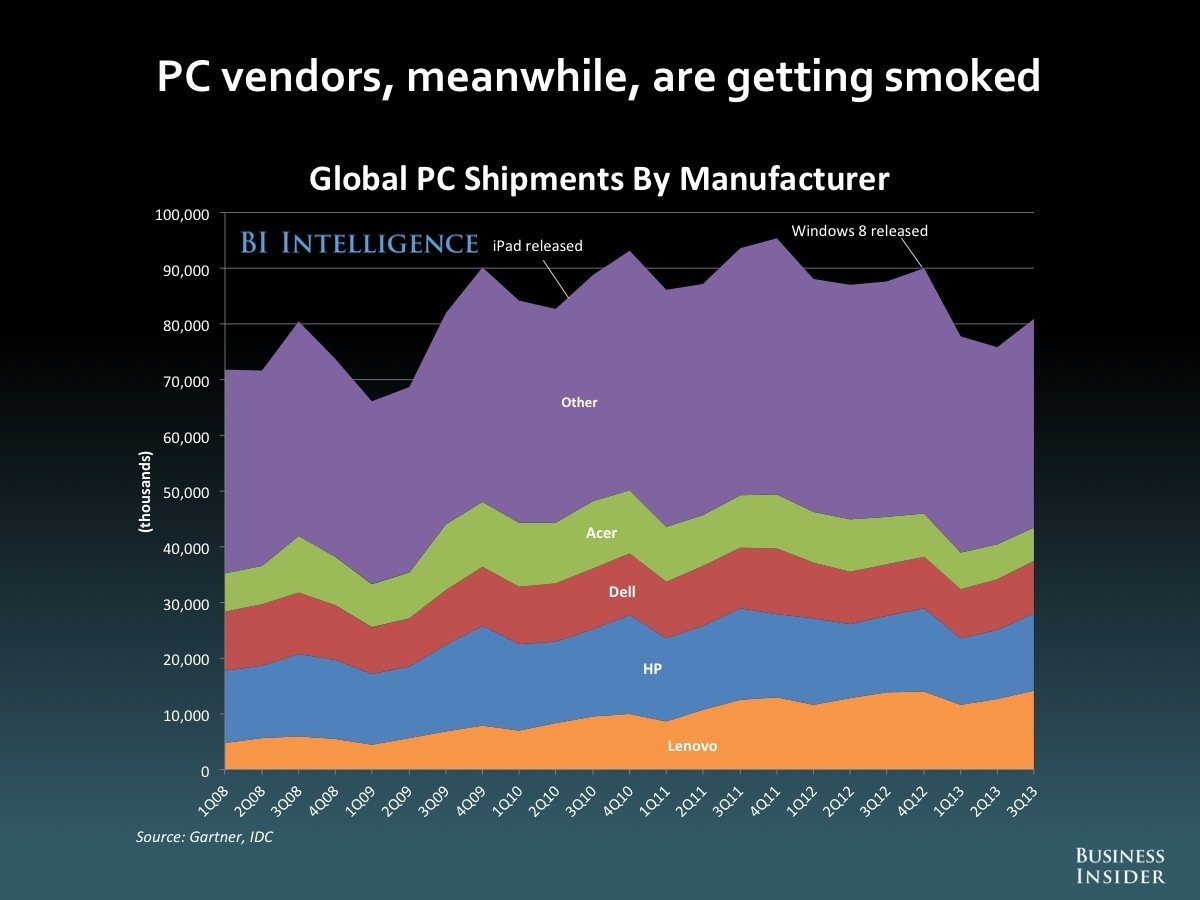
I think there’s effectively going to be a consumer strike for q4 for PCs. Only if you completely need one would you buy. ~ Charles Arthur (@charlesarthur)

Source: Mobile Is Eating The World, Benedict Evans
The global iOS & Android install base is about to pass PCs ~ Benedict Evans (@BenedictEvans)
— Some say that PC sales are going to decline by 10%…
— Some say more than 10%…
— Some are predicting that PCs are going to decline further than projected, and…
— Some say that as ugly as those forecasts look, reality is going to be worse.
Part 2: The near-term — not the far-term — implications of Mobile Computing are enormous
IF YOU CAN’T TAKE THE HEAT, EXPECT TO GET FIRED OUT OF THE KITCHEN
In 2013 the Tech CEO Bodycount ((Courtesy of Horace Dediu (@asymco))) included Microsoft, BlackBerry, Acer, Nokia with HTC teetering on the brink. And that’s just in 2013.
ONLINE MEDIA CONSUMPTION

Rule of thumb: iTunes accounts are growing at the rate of 100 million every six months. ~ Horace Dediu (@asymco)
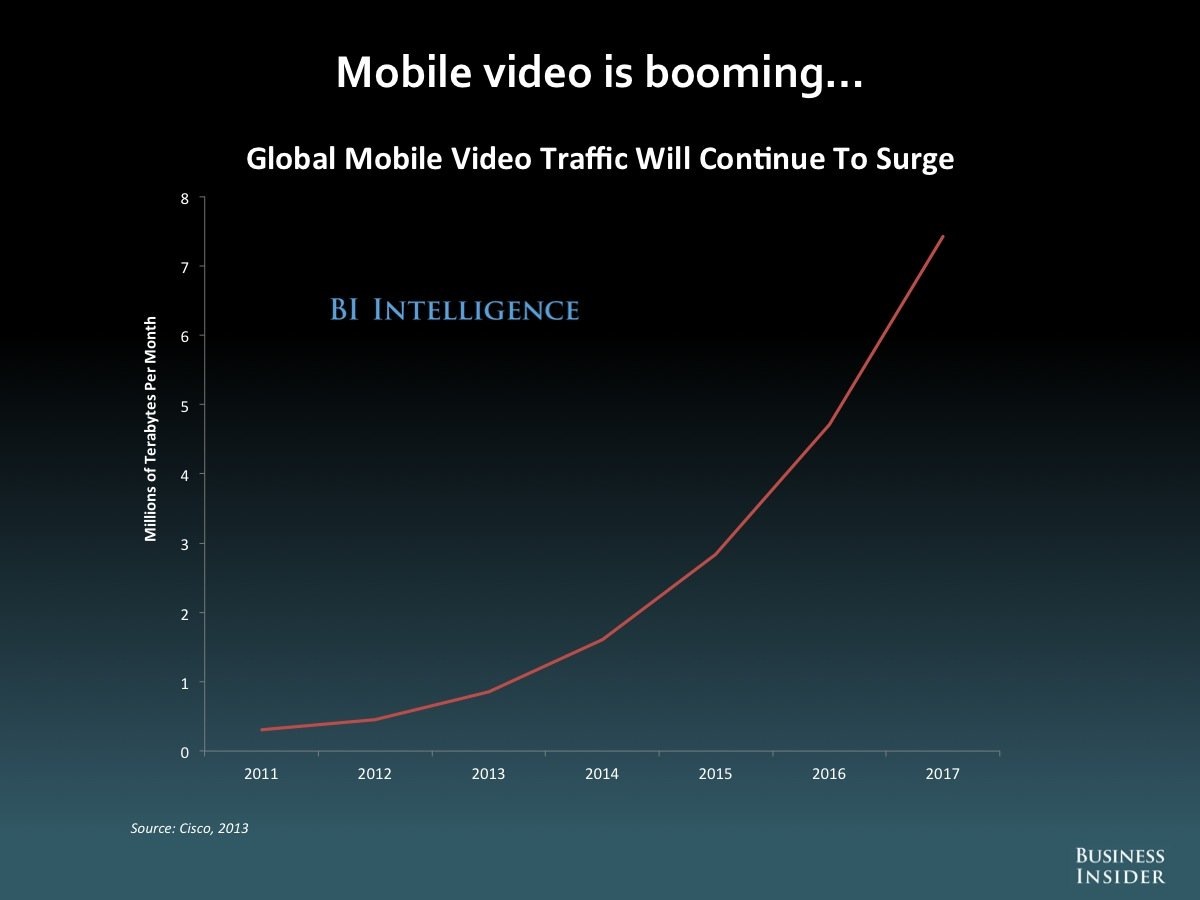
Mobile Is The Only Media That Is Growing – TV, Print, Radio Are All Shrinking ~ Aravind S (@aravinds)
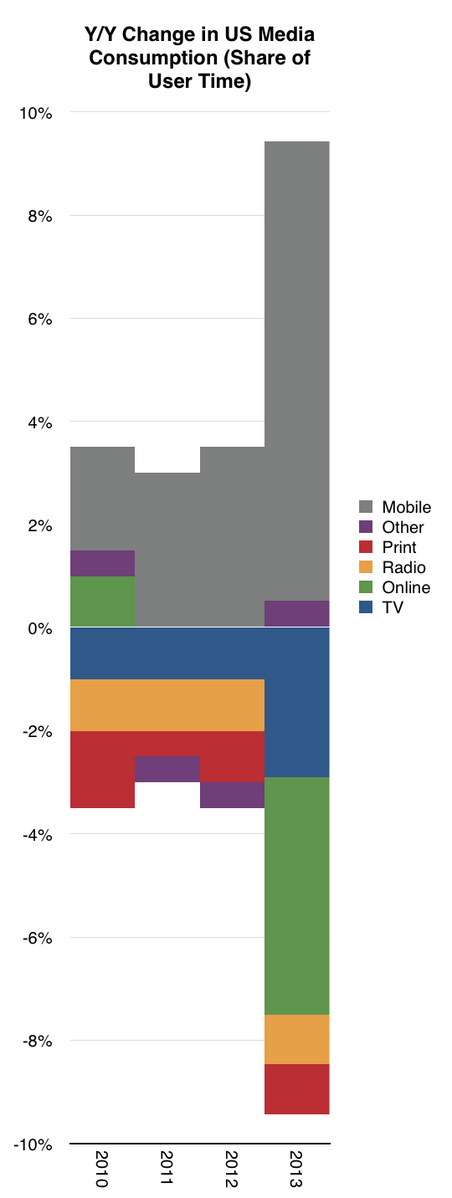
Source: Horace Dediu of Asymco
ONLINE TRAFFIC
Take a good hard look at the mobile broadband is growing and wired broadband is tapering off.
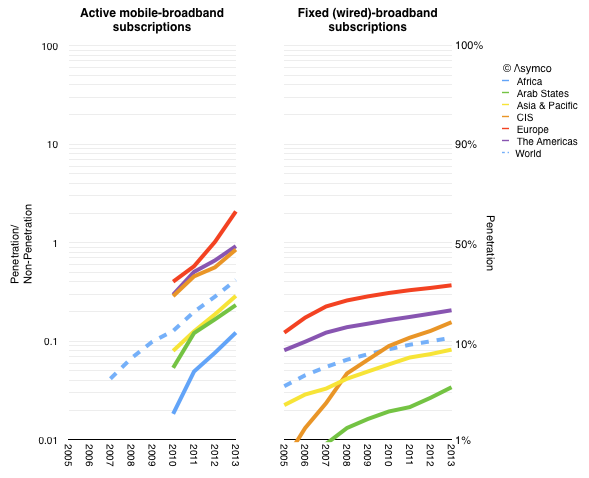
Source: Horace Dediu of Asymco
ONLINE SHOPPING
The online shopping “Pie” is getting bigger.
Online holiday shopping (desktop and mobile) in the U.S. was up 14.5% from last year.
You spent $1.2 billion shopping online on Black Friday. ~ Arik Hesseldahl
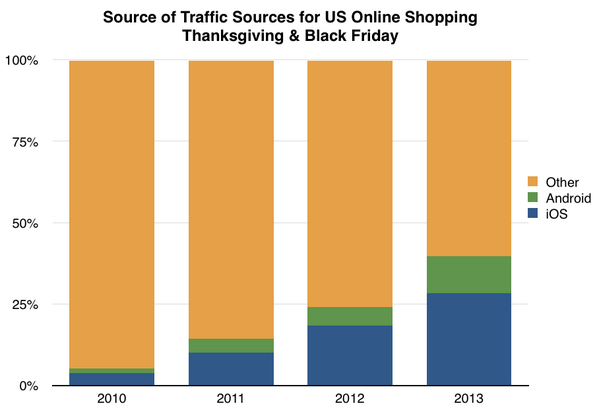
MOBILE ONLINE SHOPPING
Mobile is becoming a bigger portion of the bigger pie.
— “As of 9AM mobile accounted for 40.9% of online sales and iOS for 83% of those mobile sales.” ~ Horace Dediu (@asymco)
— iOS Devices Drive more than $543 Million, Android $148 Million in Online Sales on Dual-Billion Dollar Days ~ Adobe
It’s entirely possible and even probable that next year less than half of the online holiday shopping traffic in the US will come from PCs. Put another way, next year less than half of users will hire a PC for the job of online shopping. ~ Horace Dediu (@asymco)
MULTIPLE MOBILE v. SHARED PC
Per 100 people there are 96 mobile subscriptions and 42 households with a PC. ~ Ben Bajarin (@BenBajarin)
How is that possible?
Well, mobile devices are personal. Each person uses their own phone, they don’t share it with family members. A family, for example, may share a single PC at home, but each family member may own their own phone and even their own tablet, too.
(M)ost homes in developed markets have one PC or laptop. By 2016, these same homes will have about three tablets each… ~ Tim Bajarin
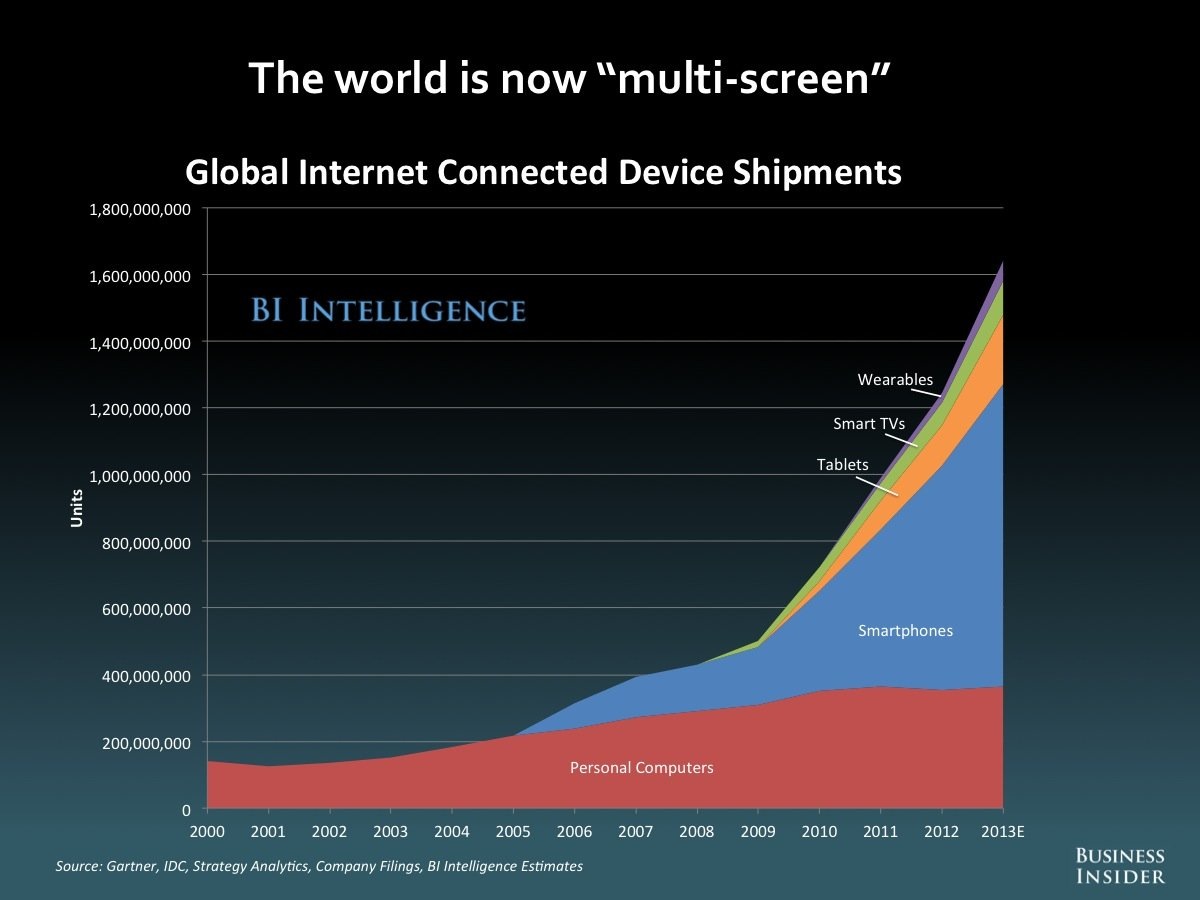
(I)t’s pretty clear that the tablet is on track to become the most pervasive personal computer the market has ever seen. The tablet has literally redefined what a personal computer is to people all over the world. ~ Tim Bajarin
Part 3: The Sea Change
Just two more points. And if you remember nothing else from this article, remember these two things:
1) The SCALE of the mobile computing revolution is larger than we think; and
2) Mobile computing is our PREFERRED way of computing.
This represents a true sea change in computing.
SCALE
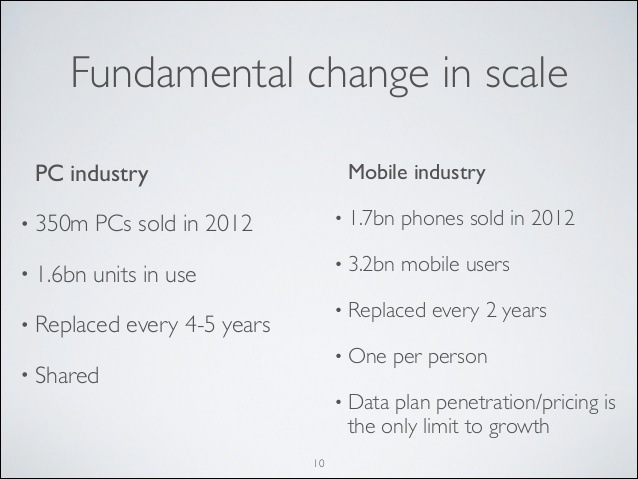
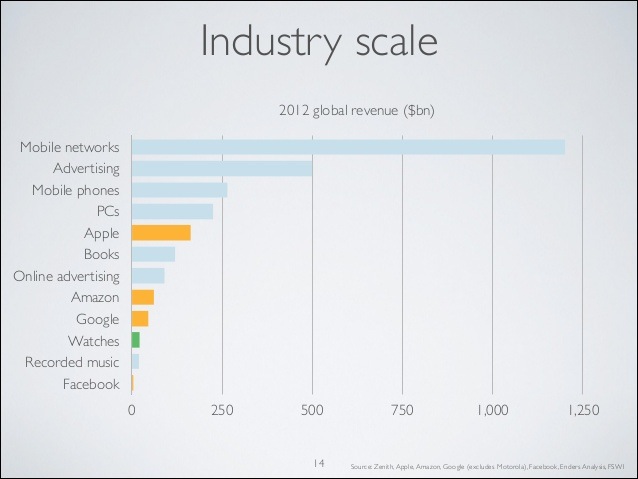
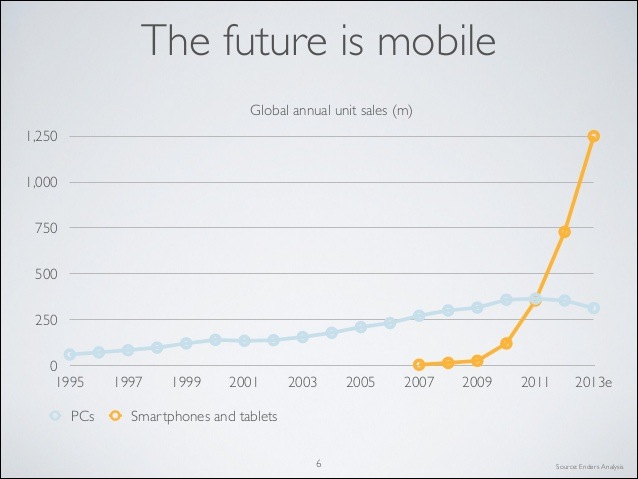
Source: Mobile Is Eating The World, Benedict Evans
I spend half my time trying to get people to grasp the scale of mobile and the other half trying to grasp it myself. ~ Benedict Evans (@BenedictEvans)
MOBILE COMPUTING IS OUR PREFERRED WAY OF COMPUTING
IBM Digital Analytics Benchmark has published, for the fourth year in a row, US online shopping traffic data with a split between mobile and fixed online traffic. It reveals a pattern of consumer behavior which is quite startling: people seem to prefer to shop using mobile devices. ~ Horace Dediu, Asymco
(Emphasis added)
When people are away from home or office, they choose the phone. When people have a choice between a phone, a tablet and a PC, they choose the tablet. The traditional PC has become the last choice, not the preferred choice, for the majority of computer users.
Part 4: It’s Not Enough To Predict The Rain; We Have To Build The Ark
To see what is in front of one’s nose needs a constant struggle. – George Orwell
CHANGE
The entire understanding of a PC has changed and the term needs to be re-defined. ~ Ben Bajarin (@BenBajarin)
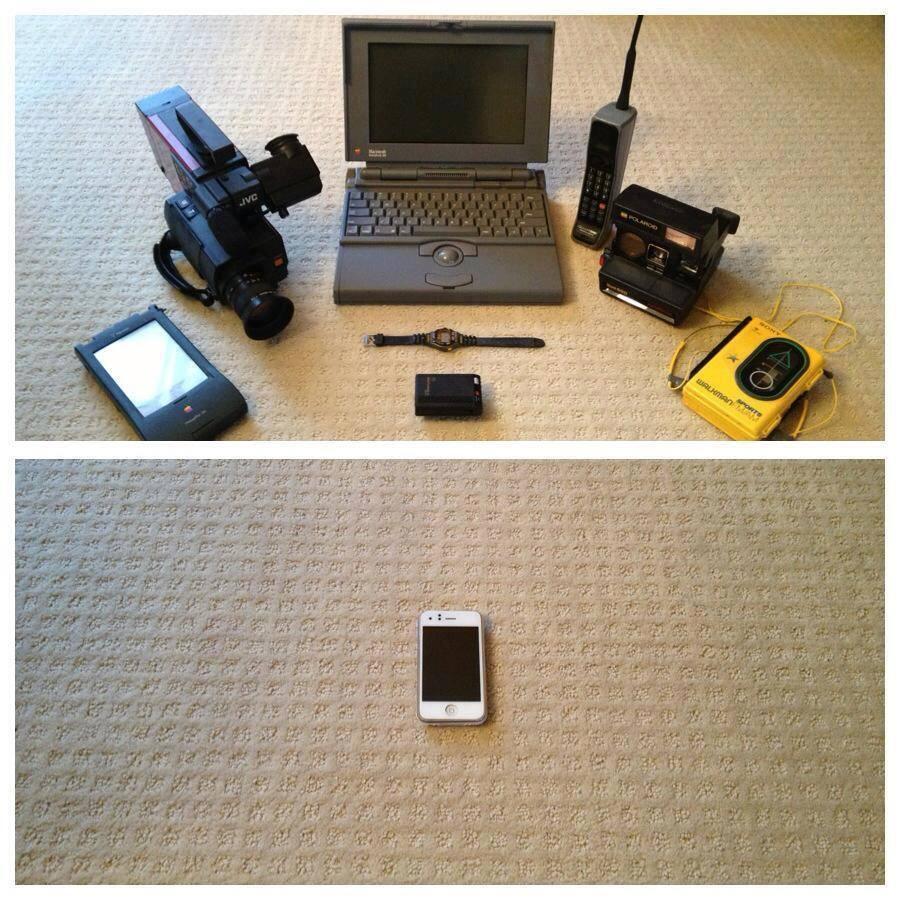
Constantly impressed by how much iPads have helped simplify computing for those previously overwhelmed by it. ~ Lessien (@Lessien)

Getting computing devices in the hands of the masses is the goal of the next 20 years. ~ Ben Bajarin (@BenBajarin)
RESISTANCE TO CHANGE
There were these two cows, chatting over the fence between their fields.The first cow said, “I tell you, this mad-cow-disease is really pretty scary. They say it is spreading fast; I heard it hit some cows down on the Johnson Farm.”
The other cow replies, “I ain’t worried, it don’t affect us ducks.”
If you don’t think that mobile computing is coming for you and your business, you’re either mad or you’re a dumb duck. Either way, you’re in big trouble.
“Change is not made without inconvenience, even from worse to better.” ~ Richard Hooker
One of the things that happens in organizations as well as with people is that they settle into ways of looking at the world and become satisfied with things and the world changes and keeps evolving and new potential arises but these people who are settled in don’t see it. That’s what gives start-up companies their greatest advantage. The sedentary point of view is that of most large companies. ~ Steve Jobs
“People don’t resist change. They resist being changed.” ~ Peter M. Senge
Change is coming and it’s coming a lot faster than we think. We can ride the wave, or we can get swept away. The choice is ours.

To say the hyperbole is getting out of hand re: mobile would be an understatement.
Not that I’m surprised because I saw the “mobile wave” as far out as 2006. But what I’d hoped was that the improvements in UI/UX ushered in through mobile devices (and consoles) would translate into a greater philosophy of more “humane” computing. Instead, a lot of type is wasted writing about tablets (the overwhelming majority of which are NOT used as “computing” devices) rather than the technologies related to the operating systems that make such devices so compelling. As I’ve pointed out before, “tablets” are not very ergonomic. They are indeed more “personal” than PCs but most are not used in the ways PCs are. The main ingredient of the tablet’s success is the operating systems, which are so much better than the ones for PCs. But what I see is an industry awed by the numbers rather than the advancement in UI/UX which have made mobile devices so appealing.
Tech analysts aren’t examining the most profound story related to the rise of mobile devices. What makes mobile technology so accessible is that it is so much more relatively obvious and predictable now. You rarely see error messages or crashes, at least nowhere near as much as when using PCs. Rarely do you take an action on a smartphone or tablet that does not result in a predictable outcome. How many times have you performed an action on a PC 20 times only to encounter a bizarre error the 21st time? Not only are mobile devices more convenient to handle, they operate more closely to the way our natural environment operates. There are fewer nasty surprises with mobile devices. PCs never really reached that point.
Are tech analysts supposed to help the public gain greater understanding or just tell the public what sells? Based on what I see, I really don’t know. Is it more important to pick winners and losers or to advance the state-of-the-art?
The sad reality is that, in the end, our institutions such as the media and corporations, are simply interested in selling product or advancing an agenda. The analysts want to tell me that Apple has sold a gazillion devices but they aren’t interested in making it clear why that is relevant. There certainly won’t be many stories related to the impact of that, the environmental or sociological effects of it. Maybe I’m jaded, but there is really no dialogue, just a bunch of “experts” regurgitating the same stale points. It’s just all a bit redundant at this point.
This is not a knock on your article John which, as always, is well written. It’s just an observation.
I’ll disagree with you on tablets and agree with you that I should have done more to talk about the touch UI.
“most are not used in the ways PCs are”
That’s the wrong way to measure computing. It’s like saying that cars are not used the way horses are. Tablets are being used the way normal people want to use computers and that’s huge.
However, I’ll readily concede that the key is not the form factor, but the touch user interface. Touch, not tablets, has brought computing to a whole new level of users.
In the strategy work I do I ask people to ask the following questions in the following
What? (E.g., pcs – tablets)
How? ( e.g., keyboards & mice – touch)
Who? ( many – most including the elder)
The first question sets the parameters for the second, and the second the third. For me what can be exciting is that the parameters can open up new possibilities rather than a contracting set of parameters l
Often like Venn diagrams.
A great article, thank you.
Mark
I’d like to hear more. If you’re interested, drop me a line at mr.johnkirk@gmail.com.
As I often say, the screen is the computer.
Agree.
“That’s the wrong way to measure computing. It’s like saying that cars
are not used the way horses are. Tablets are being used the way normal
people want to use computers and that’s huge.” – John Kirk
When I think of the number of non-Internet connected tablets being sold used primarily for video, I question whether that is truly compute. Many people have an Internet connected cable box containing a CPU attached to their TVs but is that “computing”? These tablets are being used as handheld TVs in a huge number of cases. Will that drastically change when mobile broadband is more prolific? My guess is “yes” but for now, there is still a lot of apples to oranges comparisons. On one end, you have the iPad, which clearly is a viable replacement for a traditional PC while on the other you have generic Android on a generic tablet that is not connected to the WWW and is used primarily for consumption. Between those two extremes is a whole class of devices that have roughly the same form factor yet offer a wide degree of “compute” vs “consumption.” There’s a lot of interesting sociological stuff happening that the numbers only hint at. Is the form factor intrinsic to the experience? Would more traditional form factors be more competitive if they offered computing experiences as “natural” as tablets? I think so, but it would depend on a sea change of factors. I think a major opportunity is being lost in the traditional PC space because the incumbent is more interested in changing the habits of its consumers rather than creating a product that is more natural for the consumer.
And “touch” itself is an interesting topic when it comes to computing. It’s one of the senses that evolved to help us understand our environment but touch works very differently when it comes to technology. Using touch in natural environments, we experience contours and textures but, when we interact with a tablet, almost everything relevant about touch is lost because we interact with one smooth pane of glass. Unlike using a keyboard or a mouse, we rely more heavily on our eyes when we use tablets, it’s our only form of feedback. Understanding that helps me understand how the tablet experience competes with the incumbent form factors and how both could evolve. There is a major push for “contextual” computing but a huge amount of communication comes from interpreting nuance in tone and body language. How will we be able to duplicate that technologically?
IMO, at least SOME tech analysts should be “thought leaders.” There is room for the quantitative and speculative but not much type is spent on trying to contextualize these things for people in a way that educates them re: the technology itself. I think these discussions could advance the industry and improve the actual usefulness of technology for the average person. Right now, we are expecting the people who make the technology to have all the answers. We are moving on to new challenges when we haven’t fully solved the ones we already have.
That being stated, I will say that I find more useful analysis and speculation on this site than on most others.
“you have generic Android on a generic tablet that is not connected to the WWW and is used primarily for consumption.”
Where is that Android tablet getting the consumables?
“Would more traditional form factors be more competitive if they offered computing experiences as ‘natural’ as tablets?”
I don’t think so because nothing is natural about traditional PCs (laptop or desktop) when somewhere other than a desk. Which is why it isn’t _just_ the UI, IMHO, YMMV. (couldn’t come up with any more acronyms.) A laptop is portable, but it isn’t really “mobile”.
Joe
“Where is that Android tablet getting the consumables?” – jfutral
Based on what I’ve read, the content is preloaded in some fashion. This isn’t my research, it comes from Benedict Evans. If you are skeptical, you may get better answers from him.
“I don’t think so because nothing is natural about traditional PCs (laptop or desktop) when somewhere other than a desk. Which is why it isn’t _just_ the UI, IMHO, YMMV. (couldn’t come up with any more acronyms.) A laptop is portable, but it isn’t really “mobile”.” – jfutral
You are conflating form factor with user experience. Chairs aren’t “natural” either but the act of sitting is, so the function dictated the form. That’s how PCs evolved.
“Mobility” is just one aspect of computing. It explains the development and rise of tablets as a form factor but not the decline of traditional form factors. The two should not necessarily correlate. Both have distinct use cases.
Wasn’t skeptical, just curious. Seemed odd. Just couldn’t figure out how a tablet user could consume much of anything without connection of some kind. My only other thought was maybe you meant non-wireless WWW, vs cellular data WWW.
I don’t see how you can separate the form factor from the experience and use. The mobility of tablets and phones seems to me to be a major factor in freeing people from the traditional desk usage. Laptops were the first to start to break the chains, but mobile broke the chains for all but the most heaviest use-intensive tasks.
Could better UI’s enhance desktop form factors? Sure. But that still won’t let me use that desktop or laptop while reclining on my couch. So form factor is as much a part of the experience as the UI. It would be like trying to say water is really just Oxygen. It requires Hydrogen as well. Or as the current commercial says “Sweet AND sour”.
Joe
I view computing technology as a hierarchy: smartphone (base of pyramid) to tablet/netbook to laptop to desktop and so on. My point was to illuminate that many of the conceptual advancements of tablets when it comes to the UI/UX of their operating systems could be applied to the incumbent form factors, improving the health of those portions of the industry. The PC space is in decline largely because the OS development is stagnant. How much more utility would PCs have if they were as easy to use as smartphones or tablets? Their increased size and power and better ergonomics would proportionally increase their robustness relative to tablets. But we can’t even begin to imagine it because of the way PCs currently operate. Metaphorically, it’s like being in an abusive relationship.
“But we can’t even begin to imagine it because of the way PCs currently operate.”
Because I can’t throw that laptop or desktop in my pocket and carry it with me. Or lounge on my couch or ride the subway while using a laptop or do your rounds with a laptop. You just cannot legitimately separate the form from the function thus you cannot separate the form from the UI/UX. Laptops and desktops are best used on a desk or similar set-up. Life is not only at a desk. Even on a plane, the laptop is only good until the person in the seat in front of you slams the seat into the reclining position.
Joe
“Because I can’t throw that laptop or desktop in my pocket and carry it
with me. Or lounge on my couch or ride the subway while using a laptop
or do your rounds with a laptop” – jfutral
I don’t own a tablet and I do just fine. I lounge with it without incident. I have a smartphone if I won’t to perform tasks on the move. As I stated before, form from function.
“You just cannot legitimately separate the form from the function thus you cannot separate the form from the UI/UX.” – jfutral
This is both a straw man and a non sequitur logical fallacy. The intuitiveness and effectiveness of any computing platform is based on obviousness and predictability. Those principles can be applied regardless of form factor. Part of what makes mobile platforms so effective is that they are far more obvious and predictable than PC operating systems.
“Laptops and desktops are best used on a desk or similar set-up.” – jfutral
I’m responding to this in bed.
“Life is not only at a desk”
Never claimed it was.
“I’m responding to this in bed.”
As did my wife and myself, until we got tablets and smartphones. Now our laptops rarely leave our desks.
Just because you can _make_ something work, doesn’t mean that it’s form is best suited. I can use a screw driver as a hammer from time to time, too.
“‘Life is not only at a desk’
Never claimed it was.”
Your argument about ergonomics is what puts life at a desk.
“The intuitiveness and effectiveness of any computing platform is based on obviousness and predictability. Those principles can be applied regardless of form factor. Part of what makes mobile platforms so effective is that they are far more obvious and predictable than PC operating systems.”
You realize you just countered your own position, right? Mobile platforms are as much form factor as software.
Joe
I find that using a tactile keyboard is an advantage for me, as is not supporting the weight of a tablet. As long as I’m stationary, it isn’t a disadvantage for me. I’m not “making it work,” I actually prefer it. I’ve owned iPads before, I wasn’t satisfied with the ergonomic experience because I do a lot of typing and more compute intensive tasks.
As for my statement re: ergonomics, as long as you are stationary, laptops are more ergonomic than tablets. That’s just physics. When you need or desire high mobility, a tablet is a much better choice. Some people prefer the visceral experience of a tablet vs a laptop. I’m not knocking anyone’s preference.
I rarely use my laptop at a desk. In fact, I never use it at a desk. I use it comfortably on my couch or in bed or on any random flat surface I happen to have, which includes my actual lap. I use my smartphone when I need mobility.
” find that using a tactile keyboard is an advantage for me…” – James King
I prefer tactile keyboards too. But we’re not talking about you and me. We’re talking about the majority of people and the majority are more than willing to forgo the convenience of the keyboard for the tablet’s touch interface.
Really? Or are people willing to compromise for its enhanced portability, lower price point and/or better user experience? You accuse me of making statements for “everyone” when the reverse is true. Purchasing choices come down to many factors and technology use has many tradeoffs. Tablets aren’t perfect devices anymore than laptops or desktops. Every form factor has its advantages. Just because I point out the advantage of PCs doesn’t mean that I don’t acknowledge the advantages of tablets. To the contrary, in fact.
In any case, I’m starting to see a few straw men. Please don’t put words or statements into my hands that I have not made. Stating the advantages of one form factor =/= disparaging or dismissing another.
The market decides these issues, not me, and I think it becoming clear that the market is saying that it prefers tablets over notebooks.
This is circular. The market also didn’t know that it wanted iPhones or iPads until both had already been developed.
“Just because you can _make_ something work, doesn’t mean that it’s form is best suited. ” ~ jfutral
True dat.
“You realize you just countered your own position, right?” – jfutral
No, I didn’t and your reasoning is flawed. If I wanted to type a novel, a laptop or desktop PC would be “obvious” from an ergonomic standpoint. At the very least, a tactile keyboard would be.
“Mobile platforms are as much form factor as software.” – jfutral
A mobile platform is defined by its form factor. That means that it has a form factor that is advantageous for mobile use. That’s all. Mobile devices, including tablets and smartphones existed well before iOS and Android. However, their massive adoption didn’t take place UNTIL their introductions. It was largely the user experience that changed the market dynamics of mobile devices, not the form factor. To reiterate, smartphones and tablets as form factors existed LONG before the iPhone.
“So, as I said, you can’t separate form factor from UI/UX, even by your own argument.” – jfutral
But you can apply the same principles over different form factors, which is the only point I was trying to make. The reality is that, when it comes to form factor, there really is no choice. It either suits your needs or it doesn’t. It is either suitable for a set of circumstances or it isn’t. If you want high mobility computing, there is no choice between a laptop or tablet or smartphone… the laptop simply is not suitable. However, if you want to write a novel or perform intensive image or video editing, a tablet is unsuitable. Each has a unique set of tasks for which it is best used.
“Mobile devices, including tablets and smartphones existed well before iOS and Android. However, their massive adoption didn’t take place UNTIL their introductions. It was largely the user experience that changed the market dynamics of mobile devices, not the form factor. ”
So, then, Apple could have come out with something more akin to a Blackberry and have disrupted the smartphone industry just as well?
My point is you cannot separate the form factor from the UI/UX. Even when you say using a tactile keyboard is an advantage to you, you concede the importance of the form factor to your UX. The hardware is just as important to the UI/UX, else Apple would have had no need to wait for hardware technology to catch up to how they wanted to implement a smartphone.
Joe
“My point is you cannot separate the form factor from the UI/UX.” – jfutral
My point is that you can easily “seperate” form factor from UI/UX because you can negatively impact one with the other. The IDEAL is a symbiosis but the reality can be very different. I can place an interface on a piece of hardware that will make it totally unuseable. For all practical purposes, I can treat two conjoined elements as if they are completely seperate. That is a fact.
Do I think it’s SMART to do that? No, and I implied no such thing. MY point is that the basic principles that have been applied to mobile products can be applied to PCs to make them much better. PCs do not HAVE to operate the way they do, the metaphors are legacy holdovers.
“PCs do not HAVE to operate the way they do, the metaphors are legacy holdovers.”
That I agree with. And a lot of the legacy holdovers are built into the form factor, both software and hardware.
“My point is that you can easily ‘separate’ form factor from UI/UX because you can negatively impact one with the other.”
I say because one can and inherently does have an impact on the other is precisely why you can’t separate the two. That is why the iPhone turned everything on its head. Apple sees the two as inseparable. Everyone else thought all you had to do was throw some software on a “form factor” and you were golden. Until Apple showed the two not only _need_ to work together, the UI/UX suffered when they didn’t. It is the hardware WITH the software that makes the total UI/UX what it is.
Can you chop the flower off the plant and examine just that? Sure. But it will never tell you everything about the plant and neither will it survive without the rest of the plant.
And, really, please, look up “semantic” and also the phrase “just semantics” before you throw that around next time. Just a suggestion.
Joe
“That I agree with. And a lot of the legacy holdovers are built into the form factor, both software and hardware.” – jfutral
Technology is not static. If that were the case, we’d still have PS/2 ports and floppy drives on them. Both hardware and software can be altered to improve the computing experience.
“I say because one can and inherently does have an impact on the other is
precisely why you can’t separate the two. That is why the iPhone turned
everything on its head. Apple sees the two as inseparable. Everyone
else thought all you had to do was throw some software on a “form
factor” and you were golden. Until Apple showed the two not only _need_
to work together, the UI/UX suffered when they didn’t. It is the
hardware WITH the software that makes the total UI/UX what it is.” – jfutral
I can have computers that are architecturally identical running Mac OS. Windows and Linux. All will have different user experiences. Linux experts won’t be intimidated by its UX but it wouldn’t be suitable for the average consumer. Most people use Windows but confine themselves to the tasks that are readily obvious and fairly predictable. However, they are plagued with its complexity and relative unpredictability when it comes to behavior and performance. Some choose to switch to Mac OS and Apple hardware. This eleviates much of the unpredictability and some of the complexity but it is still a very opaque, complex piece of technology.
The traits that all share is that you can perform tasks that lead to error messages. That means you can do things that have unintended consequences. Somethimes you can perform the same tasks many times yet achieve different results. Sometimes, wi-fi may cut out unexpectedly. Or the system will crash for no known reason.
This does not have to be the case.
If the form factor can be the same but the UI/UX be very different then it is apparent that the two are not inextricably linked. Form factor does not dictate UI/UX, that is a creation of the software. The rest is semantics.
What has not been achieved with PCs is a very high level of obviousness and predictability of behavior and performance. However, that is ACHIEVABLE.
“And, really, please, look up “semantic” and also the phrase “just
semantics” before you throw that around next time. Just a suggestion.” – jfutral
LOL. You’re funny.
No. Really:
http://english.stackexchange.com/questions/97318/is-the-phrase-its-just-a-matter-of-semantics-meaningless
Joe
*sigh*
The unfortunate part is that, if you had bothered to read the article to which you linked, you would have understood why people use “semantics” or “just semantics.” I’ll simplify:
They are used to indicate when someone is making a point or points that are factually or technically accurate but contextually irrelevant or meaningless.
For instance, you keep making the point that UI/UX and form factor are inseparable. This is a technically accurate statement. Hardware is useless without software and vice versa. However, in the context of our exchange, you implied that, through some inherent limitation, the user experience of PCs could not improve significantly, as if the PC had reached the limits of its evolution. In that CONTEXT, your distinction is completely inaccurate. Yes, all technology is a blend of hardware and software but NO, PCs are not inherently limited in their ability to improve their overall user experience. The very things that Apple and Google got right in their mobile OSs can be applied to the PC to make it a much better device.
You are conflating the PC NEEDING a UI component with the PC being LIMITED by its UI component. The UI itself is only limited my skill and imagination, therefore the UX is only limited by skill and imagination. The FACT is that a UI could be developed that improved the useability of PCs tremedously. There is no technical limitation that prohibits PCs from being just as relatively simple and intuitive to use as tablets. It just hasn’t been done yet.
Before you rush to disagree, please remember that the BLEND of technologies that yielded the iPhone and iPad had not been conceptualized by the market nor the tech industry at large. So the argument that “it can’t be done” by its very nature is specious because it HAS BEEN DONE by Apple on several different occassions. You simply can’t credibly state that the PC can’t be improved immensely. You can make credible arguments regarding whether it WILL be done but not one that it CAN’T be done, which is what you seem to be implying. If that is inaccurate, then please state what you actually mean.
To me, what you are stating is the same as saying that all art paintings are the same. The is a technically accurate expression. Some for of paint on a basically flat surface. But what matters is the level of skill and the interpretation. I can have 10 oil paintings but they won’t all necessarily be of the same quality. Some may come to be valued more highly than others. So the fact that, in order to have an artistic painting, I’d need oil paints and canvas is technically accurate but contextually irrelevant. The level of talent and artistic expression may create differences in the paintings as significant as night and day. In that CONTEXT, the paintings may be nothing alike.
Likewise, the differences in UI on a computing device may make the devices, the identical or near in form factor, very different devices. Hence my example re: Windows, Linux and Mac OS. Three identical devices can have three very different experiences. Yeah, the oil paints and the brush strokes may be similar. But the combination is unique. It doesn’t matter that all are painted on a canvas. The canvas itself is just the medium. To state that the canvas is essential to the painting is technically accurate but contextually irrelevant.
That expression comes from the software. Some artists wet their canvases when they used water colors. Canvases are treated in different ways at different times. But the expression is what matters. iOS and Android are expressions of computing. They are what is driving the mobile surge. The canvases always existed in one form or another.
“However, in the context of our exchange, you implied that, through some inherent limitation, the user experience of PCs could not improve significantly, as if the PC had reached the limits of its evolution,”
Never implied any such thing. I even agreed that there is room for improvement. I’ve even pointed out both MS’s and Apple’s attempt to do so. I also agreed that it is hampered by it’s legacy, both in hardware and software. I also never said nor implied “it can’t be done”. You must have inferred all that.
“…PC being LIMITED by its UI component. The UI itself is only limited by skill and imagination, therefore the UX is only limited by skill and imagination.”
I agree with that, but i will also add imagination is also often hampered by tradition. Such as my recent interchange with Bill Smith and Steve Wildstrom about the tradition of spreadsheets, or rather what they are used for, needing new imagination.
“To me, what you are stating is the same as saying that all art paintings are the same.”
That’s funny, because that is exactly what you sound like to me, especially when you throw the pejorative “semantics” around. You say that the meanings and differences do not matter. I contend they matter very much. As a matter of fact I would say market analysis is exactly about semantics (based on its real definition, not as you throw it about), what markets mean and are saying what, and what products do and don’t address them.
“re: Windows, Linux and Mac OS. Three identical devices can have three very different experiences.” etc.
Actually, the canvas is also inextricable to the resulting painting, which is why some painters prefer not to paint on canvas at all, even if with the same paint. But then all metaphors fall apart somewhere along the way.
Your OS illustration does not invalidate my point that software and hardware, together, create the total UI/UX, (speaking of “points that are factually or technically accurate but contextually irrelevant or meaningless”) which is why Apple always preferred to control the whole widget. It was Microsoft who tried to tell people that the hardware didn’t matter. That is, until it became clear that it actually _did_ matter and they kept trying to refine PnP to the level of Apple and the Mac. And why MS has now purchased a handset maker and develop their own Surface device. Your example only works in today’s environment after everyone has agreed that hardware is an important function of the UI/UX.
So far with Android, I would say Google has done at least as good a job or better than MS at trying to promote the philosophy that hardware doesn’t matter.
Joe
“Never implied any such thing. I even agreed that there is room for
improvement. I’ve even pointed out both MS’s and Apple’s attempt to do
so. I also agreed that it is hampered by it’s legacy, both in hardware
and software. I also never said nor implied “it can’t be done”. You must
have inferred all that.” – jfutral
Maybe.
“That’s funny, because that is exactly what you sound like to me,
especially when you throw the pejorative “semantics” around. You say
that the meanings and differences do not matter. I contend they matter
very much.” – jfutral
This is a subjective matter. I will concede that, while I may think of your main points as semantics, that doesn’t mean that I am correct. I’ll leave this for others who may read this to decide.
“As a matter of fact I would say market analysis is exactly about
semantics (based on its real definition, not as you throw it about),
what markets mean and are saying what, and what products do and don’t
address them.” – jfutral
My use of “semantics” was correct as it applies to rhetoric. I acknowledge that the word has other meanings and can be used in other contexts.
“Your OS illustration does not invalidate my point that software and
hardware, together, create the total UI/UX, (speaking of “points that
are factually or technically accurate but contextually irrelevant or
meaningless”)” – jfutral
Then let’s indulge in a quick thought exercise:
Which would you prefer, an iPad Retina running a non-Android version of Linux or a Galaxy Tab 8 running iOS? iOS makes any reasonably good tablet hardware a much better computing experience. But does iPad hardware make any other OS a better computing experience?
I know what my answer is, that’s why I stated that this point was contextually irrelevant. Others may agree with you that it isn’t. I have no problems letting others decide for themselves which one of our positions is more salient.
” It was Microsoft who tried to tell people that the hardware didn’t
matter. That is, until it became clear that it actually _did_ matter and
they kept trying to refine PnP to the level of Apple and the Mac. And
why MS has now purchased a handset maker and develop their own Surface
device. Your example only works in today’s environment after everyone
has agreed that hardware is an important function of the UI/UX.” – jfutral
The problem with Microsoft is that it never understood its own business model. What it didn’t understand is that, even when it is selling to businesses, it is selling to consumers.
There is nothng wrong with Microsoft’s business model. To the contrary, the margins on software licensing absolutely kill the ones on hardware sales. The problem is that, when the purchasing power shifted from the enterprise to consumers, Microsoft did not shift with it. From a user experience standpoint, Windows was always an inferior experience that’s why there are an army of Microsoft certified specialists. However, its enterprise customers didn’t care. What they valued was a consistent platform that could be reasonably maintained. They only cared if the UX was “good enough.” Consumers, on the other hand, don’t have an IT department on which to fall back. So the UX became the driving factor.
What Microsoft never understood was the 1) Windows is an inferior product from a UX standpoint and 2) consumers won’t pay for an inferior product when they have a choice. iOS and Android are those choices.
Microsoft is embracing the bone-headed decision that mimicking Apple is the answer when the actual answer was to improve the UI of Windows to the point that it is competitive from the standpoint of intuitiveness with iOS and Android. The only way Microsoft can compete is to bring Windows to at least parity with iOS and Android from a UX perspective. Instead it wants to sell an inferior product on good hardware. It’s a futile effort and dead wrong to boot.
It’s nice to control the whole widget, there may even be significant business advantages to controlling the whole widget, but you don’t NEED to control the whole widget. Samsung doesn’t, Google (mostly) doesn’t and Windows is still a multi-BILLION dollar business. The problem is that businesses and individual consumers have different values and Microsoft sucks at the thing consumers want.
In the end, the market is rejecting Windows, not PCs. Drop the price of a MacBook Air to have parity with the iPad and watch it fly off the shelves. If Apple decided to sell the MBA at cost, it wouldn’t be able to keep them in stock.
At this point, I think we are where we are. As far as points to make, I don’t have any arrows left.
” don’t own a tablet and I do just fine.” – James King
You are not everyone or even the majority of users.
Not sure what your point is but I’ll bite…
1) The majority of people on the planet do not own tablets;
2) Never claimed I was “everyone” and didn’t intimate in any way that I was or that I was championing a particular class of device one way or the other. I’ve never disparaged anyone’s technology choices on this thread or on this site. If anything, I feel that others are more likely to hold biases related to particularly companies or technologies. I prefer a reasonable level of choice. I think it’s reasonable to think others do as well;
3) Assuming that your statements were 100% correct, it doesn’t make what I said factually inaccurate. I’m doing perfectly well without a tablet. Several billion people are also.
“it doesn’t make what I said factually inaccurate”
Your statement isn’t factually inaccurate but its irrelevant to most tablet shoppers.
As tablet concerns are generally irrelevant to shoppers of other personal electronics. Once again, you are setting up a straw man. I never implied that my choices were suitable for everyone, that is simply the way you took it. I can’t control that. I CAN state that my choice MAY be relevant to someone who MIGHT decide to make a similar choice.
Low end tablets will have a usb port that allows films (often pirated) to be side loaded from a memory card. Essentially they are portable DVD players – without the DVD.
Ah! Got it. That one was baffling me. Ben brought it up in his recent article as well and it just left me scratching my head.
Thanks,
Joe
The sad reality is that, in the end, our institutions such as the media and corporations, are simply interested in selling product or advancing an agenda. The analysts want to tell me that Apple has sold a gazillion devices but they aren’t interested in making it clear why that is relevant. There certainly won’t be many stories related to the impact of that, the environmental or sociological effects of it. Maybe I’m jaded, but there is really no dialogue, just a bunch of “experts” regurgitating the same stale points. It’s just all a bit redundant at this point. (James King )
one of your best Line
that’s the problem with a lot of the so call analysts today, they do nothing but sit there, reading a lot of dubious stats that favour their view point, and put their spin on it to either smear or promote a company they like or hate, as if they were a fan or a sells man.
in their minds, a stats explain everything about a company, the consumer and the greater society and often act, as if they know better than even those who run the company themselves, hence we often learned nothing that we did not already know by reading their articles.
“…the overwhelming majority of which are NOT used as “computing” devices”
The overwhelming majority of PCs aren’t used as computing devices.
The PCs are mainly used for email, or browsing or word processing or watching video or looking at photographs. Just like tablets. Though the tablet is more likely than the PC to be used for shooting the videos and the photographs.
The smartphone, even more so.
The last time CPU power played the major part in my PC purchasing decision, was because the machine needed to be suitable for HD video editing.
My preferred HD video editing platform is now… an iPhone 5S.
You say that tablets aren’t used as computing devices and by implication, that PCs are. And it’s also clear that this has a negative/patronising undertone?
So what is this magical role that makes a computing device special and somehow more worthy, and that by implication, most PCs ARE used for?
You say that tablets aren’t used as computing devices and by
implication, that PCs are. And it’s also clear that this has a
negative/patronising undertone?
The “implication” of my statement was that the platforms do not really compete, that,despite media claims, there isn’t a natural “winner” or “loser”. One platform is in ascendency because it actually solves a unique set of problems, one being a newer, more convenient form factor while the other is more natural, intuitive computing. Though PCs aren’t as convenient as mobile devices, they are, however, more ergonomic. They have advantages of power and efficiency of use that are not being leveraged effectively because of the stagnation from lack of competition in the development of their operating systems. Many of the same principles that make mobile devices more effective computing platforms could be applied to PCs but have not yet been. It is a market opportunity that is being ignored.
As for it being “negative” or “patronizing,” I can’t please everyone so I don’t try. You’re welcome to feel however you feel about it. That’s subjective.
Hope that clears that up for you.
“EDIT: Based on the research, a huge amount of tablets aren’t being used for PC tasks but are being used more like portable TVs. They aren’t even web connected.”
That doesn’t mean they aren’t replacing PC usage, though. There are a huge number of PCs that weren’t doing PC tasks and weren’t even web connected. The point is, a lot of things that used to be PC exclusive, regardless of one’s opinion of what constitutes a “PC task”, are being off loaded to mobile devices making less of a need to purchase new PC hardware. Steve Jobs and MS’s old graphics of the PC being the digital hub is no longer in play. The PC and its uses are being decentralized.
Joe
“That doesn’t mean they aren’t replacing PC usage, though. There are a
huge number of PCs that weren’t doing PC tasks and weren’t even web
connected.” – jfutral
This is semantics. A TV technically does “PC tasks,” does that make it a computer? If I use an HTPC, am I “computing”?
They key is whether I decide to purchase a tablet over a PC. Guess what? There is no CONCLUSIVE evidence that such a thing is occurring. The problem is that there could be MANY reasons why PC sales are in decline. This notion that “tablet sales are up, PC sales are down, therefore they correlate” is a supposition with almost zero context. Ben Bajarin just wrote an article on this site addressing that issue.
Once again, from me:
“The “implication” of my statement was that the platforms do not really compete, that,despite media claims, there isn’t a natural “winner” or “loser”.”
Causality is being inferred but it has not been PROVEN.
I don’t know that it was ever actually “proven” that automobiles affected horse drawn carriage sales either. Maybe it was, but the causality is present for the mildly observant and can be easily deduced.
Joe
Smartphones outsell PCs as well. I guess they too are responsible for the decline of PCs.
I would agree with that. And for the same reasons tablets are (at least in part) responsible for the decline of PCs, the decentralization of computing.
Joe
Tablets and smartphones are simply new form factors serving areas of the market that were previously underserved. In other words, the computing model was extended. The economics and UX dynamics serves a greater portion of people than the traditional PC model. The two only vaguely correlate.
“The two only vaguely correlate.”
Understatement of the year. You read it here first!
Joe
“They have advantages of power and efficiency of use that are not being leveraged effectively because of the stagnation from lack of competition in the development of their operating systems. Many of the same principles that make mobile devices more effective computing platforms could be applied to PCs but have not yet been. It is a market opportunity that is being ignored.”
I would say Microsoft would disagree with you here. They are trying (as poorly as it is turning out) to do just that. And as Apple releases each new MacOS, all both companies hear when trying to address just this is how much a bad idea it is and people really want the old way of doing things. So I say a market opportunity is not being missed. The market wants faster horses, not a better UI, at least for PCs. They don’t want desktop PC v2. They want PC v1.5. Which baffles me to no end.
I think this is one of the reasons Apple did so well with the iPhone and iPad. They got to define for themselves what mobile computing should be, including the hardware. Mobile computing up until them was confined to very niche markets, sadly including the Newton. And the form factor, other than being small, was all over the place design-wise. Now hardware has coalesced around Apple’s form factor. This is why a lot of people believe the future of computing is mobile, not traditional PCs. If anything, I would say the markets have spoken loud and clear. The markets don’t seem to want the PC to be anything other than what it already is.
Joe
“I would say Microsoft would disagree with you here. They are trying (as
poorly as it is turning out) to do just that. And as Apple releases each
new MacOS, all both companies hear when trying to address just this is
how much a bad idea it is and people really want the old way of doing
things. So I say a market opportunity is not being missed.” – jfutral
It isn’t a matter of whether Microsoft or Apple would agree or disagree with me, it is a matter of whether their products are effective. Your argument is circular. Let’s look at the unverifiables:
1) “all both companies hear when trying to address just this is
how much a bad idea it is and people really want the old way of doing
things.” – jfutral
Besides this being a completely unverifiable claim, this is why you design a product for a purpose and not a market. Just because a company builds a product, it doesn’t mean that the company has any real idea whether that product is or will serve that market. This is a non-sequitur logical fallacy.
“The market wants faster horses, not a better UI, at least for PCs. They don’t want
desktop PC v2. They want PC v1.5. Which baffles me to no end.” – jfutral
See above. Once again, an unverifiable claim and a non-sequitur logical fallacy.
“I think this is one of the reasons Apple did so well with the iPhone and
iPad. They got to define for themselves what mobile computing should
be, including the hardware.” – jfutral
This is holding up your own straw man. This supposes that Apple’s efforts in PCs is the best that can be done (it isn’t). This also doesn’t refute the FACT that smartphones and tablets AS FORM FACTORS existed long before the iPhone. Apple’s work was completely derivative. It wasn’t new, just refined. The aspect of the iPhone that was almost entirely new was iOS. Capacitive touch had been in development for years. But no one had built an OS specifically designed to use it.
“Mobile computing up until them was confined to very niche markets, sadly
including the Newton. And the form factor, other than being small, was
all over the place design-wise. Now hardware has coalesced around
Apple’s form factor.” – jfutral
It isn’t Apple’s form factor. Flat tablets existed long before the iPad. Apple’s work is entirely derivative. Once again, a refinement but NOT original. This is a FACT. Once again, you are using speculation to support a straw man.
“This is why a lot of people believe the future of computing is mobile, not traditional PCs. If anything, I would say the markets have spoken loud and clear. The markets don’t seem to want the PC to be anything other than what it already is.” – jfutral
This is a circular argument. Using the state of a situation to justify the situation. The market didn’t know that it wanted the iPhone or iPad until both had actually been developed. They prove the fallacy of your position.
Your rhetorical skills need a lot of work.
My rhetorical skills seem to be serving me just fine if that is the only basis for your arguing.
There have been numerous illustrations, both in court and on the internet, of tablet and smartphone forms before and after iPhone and iPad. You can call them unverifiable all you want. But that is only the case if you either A) don’t do a lot of tech news reading or B) don’t know how to search the internet.
“Capacitive touch had been in development for years. But no one had built an OS specifically designed to use it.”
EXACTLY!!!
As for critique of desktop OS changes, completely verifiable (if you actually try). Just read the critiques here of Windows 8 and what the rest of the press had to say about the need for 8.1. And back when Apple was releasing Mac OS Lion and Mt. Lion the press accused Apple of trying to merge iOS with MacOS and how this was succumbing to the “dumbing down” of computing.
Joe
“There have been numerous illustrations, both in court and on the
internet, of tablet and smartphone forms before and after iPhone and
iPad. You can all them unverifiable all you want. But that is only the
case if you either A) don’t do a lot of tech news reading or B) don’t
know how to search the internet.” – jfutral
Straw man. I didn’t state that this particular point was unverifiable, I stated that it was a straw man. My actual statement:
“It isn’t Apple’s form factor. Flat tablets existed long before the iPad.
Apple’s work is entirely derivative. Once again, a refinement but NOT
original. This is a FACT. Once again, you are using speculation to
support a straw man.”
What part of this is untrue?
“”Capacitive touch had been in development for years. But no one had built an OS specifically designed to use it.”
EXACTLY!!!” – jfutral
Ummm… okay? This proved my point that software was the compelling factor, not the hardware or form factor. It’s a basic reality of computing that hardware will improve over time (Moore’s Law, etc) but the same does not apply to software. When software makes a leap, as iOS and Android did, that is when the sea change happens.
“As for critique of desktop OS changes, completely verifiable (if you
actually try). Just read the critiques here of Windows 8 and what the
rest of the press had to say about the need for 8.1. And back when Apple
was releasing Mac OS Lion and Mt. Lion the press accused Apple of
trying to merge iOS with MacOS and how this was succumbing to the
“dumbing down” of computing.” – jfutral
What is unverifiable are your claims regarding what the market wants, which I stated clearly and you have chosen to distort. The market has no idea what it wants. You want to throw around that “faster horse” statement but that was Ford’s way of stating that a company has to build the product that IT feels needs building, not what the market desires. The market should not drive development of any OS. And if Ford built a car that was slower than a horse and required more upkeep, he would have failed. Because the automobile was a bad idea? No, because his IMPLEMENTATION of the automobile failed.
Keep setting these straw men up, I’ll keep knocking them down.
“Keep setting these straw men up, I’ll keep knocking them down.”
Uh, yeah, sure. You keep “knocking them down” then.
Joe
Like I stated, you’re funny.
“”Capacitive touch had been in development for years. But no one had built an OS specifically designed to use it.”
EXACTLY!!!” – jfutral
Ummm… okay? This proved my point that software was the compelling factor, not the hardware or form factor.”
I forget which article I read that the iPhone was not actually released until capacitive touch screens had developed far enough for the iPhone to take advantage of it. There would be no iPhone without a capacitive screen. The hardware was a _very_ compelling reasons. Without it, iOS could not function as it does.
Sweet AND sour.
Joe
iOS could have been developed with resistive touch and still been revolutionary.
Apparently, Apple disagrees.
Joe
If Apple followed the desires or realities of the market, the iPhone would have been introduced with resistive technology. In the end, Jobs made the product he wanted to make, not the one the market demanded.
“In the end, Jobs made the product he wanted to make, not the one the market demanded.”
I absolutely agree with that.
Joe
There is a huge difference between what people think the market wants and what buyers are actually willing to pay for.
I agree. That’s why falling back on the wisdom of the market is a double edge sword. It doesn’t always know what it wants and can only choose from the options given. A company can try to give the public what it thinks it wants or give them what it thinks it MAY want. Both courses of action will always entail a certain amount of risk. But, in the end, a company can’t SET the demand of the market. It either discovers it or meets it when it becomes clear. Apple routinely discovers it, Samsung routinely meets it. Microsoft seems to want to set it and that’s why I think it’s failing in the consumer space (Xbox notwithstanding).
“The analysts want to tell me that Apple has sold a gazillion devices but they aren’t interested in making it clear why that is relevant.”
Strange. I’ve seen no end of articles about
– the impact of instant on mobile connected devices
– the integration of smart mobile devices into medicine in remote area
– the impact of mobile one per child devices in teaching
– the advantages of tablets for reading by for the partially sighted
– the use of tablets as play learning devices by pre school children who cannot read and write yet.
– the take up of tablets by people who were never interested in, or where intimidated by traditional PCs
Perhaps you should broaden your reading base beyond PCBuyer
I read these articles as well but they don’t make up the bulk of tech analysis or even a large percentage. Now how many articles do you read on:
The impact of tech dependence: what would happen if a massive EMP device fried our electronics?
What has been the impact of technology re: the world’s biggest problems: how is tech aiding in the fights against crime, poverty injustice, Is it making a dent?
What makes a computing platform effective? Is is magic or science? How can computing become more intuitive? How do we universally address the usability of computing devices?
There is a ton of uncovered ground. There are plenty of spot articles but, as I’ve stated, the bulk of analysis centers on the financial.
The one thing I don’t welcome with the mobile computing revolution is the two year replacement cycle. Even with the current recycling programs, that’s still a lot more landfills, a lot more energy use, and a lot more of general waste of resources. I don’t know if there is any solution in sight. The pace of technological advancement is just so fast.
At least it is a lot less wasteful than the old two- or three-year replacement cycle for PCs. There’s much less material to begin with and a lot of progress has been made in getting the toxic stuff out, particularly no more lead.
This is one of the reasons why Apple is working so hard on making their products recyclable. Not only is the part count low. Not only does Apple facilitate reuse of refurbished devices. They make their devices such that they are > 95% energy recoverable.
Desktops are bulkier but are much easier to repair and upgrade. Tablets are thinner but are on a faster upgrade cycle and easier to replace than repair or upgrade.
There is still the matter of conflict minerals.
And don’t kid yourself-“recycling” is no bed of roses. http://www.youtube.com/watch?v=_PgbrPiUG0M
“Tablets are not “cannabalizing” PC’s, they’re eating them up.”
No, they aren’t. PC sales are down, quite a bit, yes. But are people throwing out their PCs when they get tablets? I don’t think so. I get that the dramatic transformation of the tech landscape that is underway is exciting and dramatic to you, but like James King said in the first comment here, you need to try to keep your feet on the ground.
Yes, people find tablets easier and more enjoyable to use. Yes, tablets fulfill their needs for a mobile computer much better than laptops, and hence rather than spending money on a laptop, people are buying themselves a tablet.
However, those desktop and laptop computers aren’t going anywhere. They’re still needed for typing, for that one app that isn’t on the tablet that you need to have (whether it’s a genealogy program you’ve put hundreds of hours of data into or your tax software or Word), for wrangling one’s Itunes library, and for storing pictures and video that won’t fit on your tablet (cloud storage is very much not there yet, partly because it’s expensive, but mostly because upload bandwidth is so slow).
The PC market is down only partly because of the growth of tablets. Mostly, I suspect it’s down because people are content with their old computer. A core 2 duo with 2gb of RAM (basically any computer from the past 5 years) is more than adequate for typing and web surfing. And with the way hard drives have become more reliable in the past few years, there’s no reason why a computer shouldn’t continue to work for years and years of service. In the current economy, people are going to be leery of replacing something that still works just fine. Microsoft’s idiotic decision to change the fundamentals of using their OS is of course another nail in the coffin.
People are not throwing out the PCs, but they are buying tablets instead of PCs when the time comes to upgrade.
“are people throwing out their PCs when they get tablets?” – Glaurung-Quena
That’s the wrong question. The proper question is whether people are buying tablets in lieu of PCs.
“My use-case is universal.”
Hey. Do they make an adult iPotty?
Joe
That IS the adult iPotty. 🙂
“…if you remember nothing else from this article, remember … The SCALE of the mobile computing revolution is larger than we think”
Why remember something that becomes untrue by the very act of remembering it?
“We forget all too soon the things we thought we could never forget.” ~ Joan Didion
I recently tried CBD gummies on the side of cbd + thc gummies the word go time and they exceeded my expectations. The mouthful was entertaining, and helped me unwind and relax. My concern noticeably decreased, and I felt a nous of blanket well-being. These gummies are now a indispensable in my self-care routine. Exceptionally suggest against a ordinary and soft experience.
Superb post however I was wanting to know if you could write a litte more on this topic? I’d be very grateful if you could elaborate a little bit more.
You’re so awesome! I don’t believe I have read a single thing like that before. So great to find someone with some original thoughts on this topic.
The CBD SEO Workings delivers top-notch services pro businesses in the thriving CBD industry. With a strategic come close to to Search Motor Optimization (SEO), they cbd seo agency excel in enhancing online visibility and driving organic traffic. Their expertise lies in tailoring SEO strategies specifically for CBD companies, navigating the unexcelled challenges of this hollow market. Via wide keyword delve into, content optimization, and link-building tactics, they effectively increase search rankings, ensuring clients stand out of pocket amidst competition. Their team’s hallowing to staying updated with exertion trends and search appliance algorithms ensures a emphatic and junk approach. The CBD SEO Action’s commitment to transparency and customer communication fosters safe keeping and reliability. Inclusive, their specialized services pamper to the explicit needs of CBD businesses, making them a valuable partner in navigating the digital aspect within this competitive market.
CBD exceeded my expectations in every way thanks . I’ve struggled with insomnia on years, and after infuriating CBD in the course of the from the word go mores, I at the last moment experienced a loaded eventide of restful sleep. It was like a force had been lifted misled my shoulders. The calming effects were indulgent still scholarly, allowing me to drift afar uncomplicatedly without sensibilities confused the next morning. I also noticed a reduction in my daytime anxiety, which was an unexpected but welcome bonus. The cultivation was a fraction rough, but nothing intolerable. Comprehensive, CBD has been a game-changer inasmuch as my sleep and uneasiness issues, and I’m appreciative to arrange discovered its benefits.